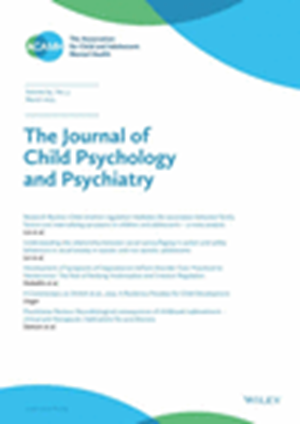Can a warm and supportive adult protect against mental health problems amongst children with experience of adversity? A twin‐differences study
IF 6.5
1区 医学
Q1 PSYCHIATRY
引用次数: 0
Abstract
BackgroundAdverse childhood experiences (ACEs) are associated with mental health problems, but many children who experience ACEs do not develop such difficulties. A warm and supportive adult presence in childhood is associated with a lower likelihood of developing mental health problems after exposure to ACEs. However, it is unclear whether this association is causal, as previous research has not accounted for genetic and environmental confounding.MethodsWe used the twin‐difference design to strengthen causal inference about whether a warm and supportive adult presence protects children exposed to ACEs from mental health problems. Participants were from the Environmental Risk (E‐Risk) Longitudinal Twin Study, a UK population‐representative birth cohort of 2,232 same‐sex twins. ACEs were measured prospectively from ages 5 to 12. Maternal warmth was assessed at ages 5 and 10 through maternal speech samples. Adult support was assessed through child reports at age 12. Mental health problems were assessed through interviews at age 12 with parents and teachers and participants at age 18.ResultsAmong children exposed to ACEs, those who experienced greater maternal warmth and adult support had lower levels of mental health problems at ages 12 and 18. In monozygotic twin‐difference analyses, the protective effects of maternal warmth and adult support on mental health were attenuated by 70% for maternal warmth and 81% for adult support, compared to phenotypic analyses. Twins who experienced greater maternal warmth and adult support had minimal or no difference in mental health compared to their co‐twins, concordant for ACE exposure.ConclusionsThe apparent protective effect of a warm, supportive adult against mental health problems following ACEs is largely explained by genetic and environmental confounding. This suggests that interventions which boost maternal warmth and adult support should be supplemented by components addressing wider family environments and heritable vulnerabilities in children exposed to adversity, to improve mental health.温暖和支持性成人能否保护经历逆境的儿童免受心理健康问题的困扰?双胞胎差异研究
背景童年时期的不良经历(ACE)与心理健康问题有关,但许多经历过 ACE 的儿童并没有发展成心理健康问题。童年时期成人的温暖和支持与遭遇 ACE 后出现心理健康问题的可能性较低有关。然而,由于之前的研究没有考虑到遗传和环境的混杂因素,因此目前还不清楚这种关联是否是因果关系。方法我们采用了双胞胎差分设计来加强因果推断,以确定温暖和支持性的成人陪伴是否能保护遭受 ACE 的儿童免受心理健康问题的影响。参与者来自环境风险(E-Risk)纵向双胞胎研究,该研究是英国一个具有人口代表性的出生队列,由2232对同性双胞胎组成。从 5 岁到 12 岁,对 ACE 进行了前瞻性测量。在 5 岁和 10 岁时,通过母亲的言语样本对母亲的温暖程度进行评估。成人的支持通过儿童 12 岁时的报告进行评估。结果在受到ACE影响的儿童中,那些经历过更多母性温暖和成人支持的儿童在12岁和18岁时的心理健康问题水平较低。在单卵双胎差异分析中,与表型分析相比,母性温暖和成人支持对心理健康的保护作用分别减弱了70%和81%。与同卵双胞胎相比,获得更多母性温暖和成人支持的双胞胎在心理健康方面的差异很小或没有差异,这与暴露于 ACE 的情况一致。这表明,在采取增强母亲温暖和成人支持的干预措施的同时,还应辅之以针对更广泛的家庭环境和逆境儿童遗传脆弱性的干预措施,以改善儿童的心理健康。
本文章由计算机程序翻译,如有差异,请以英文原文为准。
求助全文
约1分钟内获得全文
求助全文
来源期刊
CiteScore
13.80
自引率
5.30%
发文量
169
审稿时长
1 months
期刊介绍:
The Journal of Child Psychology and Psychiatry (JCPP) is a highly regarded international publication that focuses on the fields of child and adolescent psychology and psychiatry. It is recognized for publishing top-tier, clinically relevant research across various disciplines related to these areas. JCPP has a broad global readership and covers a diverse range of topics, including:
Epidemiology: Studies on the prevalence and distribution of mental health issues in children and adolescents.
Diagnosis: Research on the identification and classification of childhood disorders.
Treatments: Psychotherapeutic and psychopharmacological interventions for child and adolescent mental health.
Behavior and Cognition: Studies on the behavioral and cognitive aspects of childhood disorders.
Neuroscience and Neurobiology: Research on the neural and biological underpinnings of child mental health.
Genetics: Genetic factors contributing to the development of childhood disorders.
JCPP serves as a platform for integrating empirical research, clinical studies, and high-quality reviews from diverse perspectives, theoretical viewpoints, and disciplines. This interdisciplinary approach is a key feature of the journal, as it fosters a comprehensive understanding of child and adolescent mental health.
The Journal of Child Psychology and Psychiatry is published 12 times a year and is affiliated with the Association for Child and Adolescent Mental Health (ACAMH), which supports the journal's mission to advance knowledge and practice in the field of child and adolescent mental health.

 求助内容:
求助内容: 应助结果提醒方式:
应助结果提醒方式:


